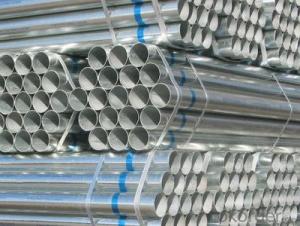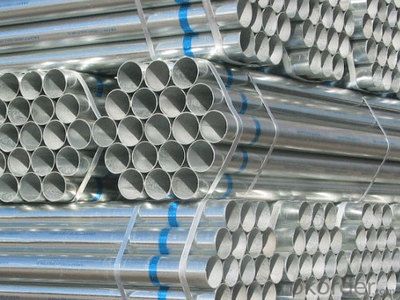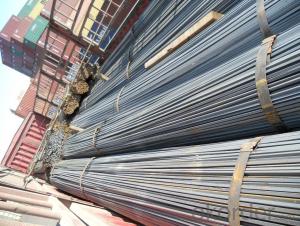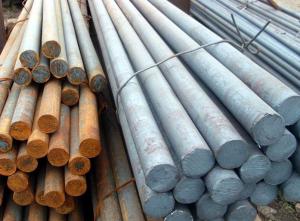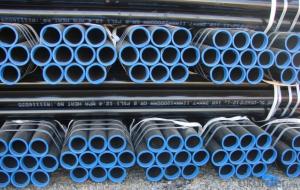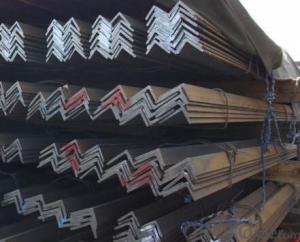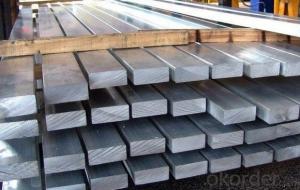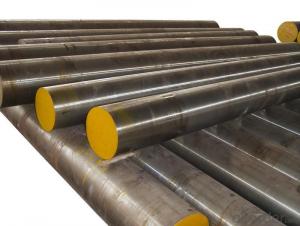Construction Circle Steel Pipe Q235 Grade
- Loading Port:
- Tianjin
- Payment Terms:
- TT or LC
- Min Order Qty:
- 300 m.t.
- Supply Capability:
- 1000 m.t./month
OKorder Service Pledge
OKorder Financial Service
You Might Also Like
Construction Circle Steel Pipe Q235 Grade
Description for Construction Pipe :
Type | Galvanized pipe |
Steel Grade | Q345,Q195,215,Q235, |
Size | DIA 13-25.4mm, 18-25.4mm,25.4-34mm,34-50.8mm,50.8-79.2mm
|
Thickness | 0.5-1.5mm,1.5-2.0mm,0.7-2.0mm,0.8-3.0mm,1.0-3.0mm |
Application | Building/project construction |
Packing | 5.5mm-10mm:packing In coil. 10mm-32mm:in bundle. |
MOQ | 300tons ( trial order 100tons acceptable ). |
Capacity | 15000tons /month. |
Delivery Time | 15days after the order confirmation . |
Payment | T/T , West Union , Cash , L/C. |
Trade Terms | FOB, CFR, CIF ,EXW |
Trans term | FIO , FILO , FLT |
Datas Chart for Galvanized Pipe :
Content | C% | Mn% | Si% | P% | S% | V% | Ceq% |
HRB335 | 0.17-0.25 | 1.00-1.60 | 0.40-0.80 | ≤0.045 | ≤0.045 | ≤0.52 | |
HRB400 | 0.20-0.25 | 1.30-1.60 | 0.40-0.80 | ≤0.035 | ≤0.035 | 0.05-0.08 | ≤0.54 |
HRB500 | 0.25 | 1.6 | 0.80 | ≤0.045 | ≤0.045 | ≤0.55 | |
HRB500E | 0.20-0.24 | 1.20-1.50 | 0.40-0.65 | ≤0.045 | ≤0.045 | 0.050-0.120 | ≤0.55 |
Main Structure of Galvanized Steel Circle Pipe
l Mechanics Performance
Grade | Technical data of the original chemical composition(%) | |||||||
C | Mn | Si | S | P | Ceq | |||
HRB500 | ≤0.25 | ≤1.60 | ≤0.80 | ≤0.045 | ≤0.045 | ≤ 0.55 | ||
Mechanical Characterics | ||||||||
Yield Strength (N/cm2) | Tensile Strength (N/cm2) | Elongation (%)
| ||||||
≥500 | ≥630 | ≥14 | ||||||
FAQ:
Why should you choose us:
Stable quality ----continous casting hot rolled production techenic, strictly quality control system.
Lower price -------Not the cheapest but the lowest price at the same quality .
Good service -----Satisfactory service within 24hours.
Delivery time ------15-25days for the mass production .
Discount---------------discount base on monthly large quantity purchase in long term.
Picture:
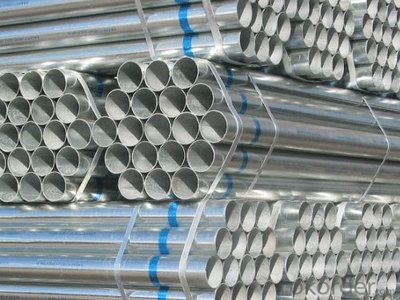
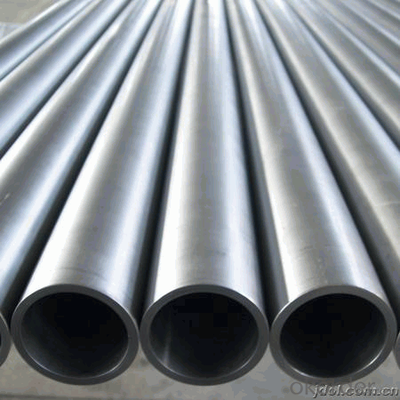
- Q: What type of steel pipe dance is used in general?
- The steel pipe fittings used in the pipe dance are made of smooth surface material, usually chrome or polished by steel or iron.
- Q: What is the difference between internal and external coating for steel pipes?
- A protective layer is applied to the inner surface of steel pipes, which is known as internal coating. The main purpose of this coating is to prevent corrosion and enhance resistance against chemicals present in the fluid being transported. Techniques like spraying, brushing, or dipping are commonly used to apply the internal coating, and it can be made of materials such as epoxy, polyurethane, or cement mortar. On the contrary, external coating involves the application of a protective layer on the outer surface of steel pipes. The main objective of this coating is to protect against environmental factors like corrosion, abrasion, and impact. External coatings are usually applied through methods like wrapping or coating with materials such as polyethylene, fusion-bonded epoxy, or asphalt enamel. To summarize, the primary difference between internal and external coating for steel pipes lies in their location and purpose. Internal coatings safeguard the inner surface from corrosion and chemical attacks, while external coatings provide protection against environmental damage on the outer surface. Both types of coatings are essential to ensure the durability and reliability of steel pipes in various applications.
- Q: How to make the magnetic steel, can be like a magnet?
- Magnetization. Winding the insulated wire on the object, passing in the direct current, and taking it down after a period of time.
- Q: What are the common protective coatings used on the inner surface of steel pipes?
- The common protective coatings used on the inner surface of steel pipes include epoxy, polyurethane, and cement mortar coatings. These coatings provide corrosion resistance, prevent the formation of scales, and improve the durability and lifespan of the pipes.
- Q: A333gr6 steel pipe and domestic material of the same?
- The SA333 standard in ASME (cryogenic seamless and welded nominal steel tubes), so A333-6 is a representation of the United States, followed by many countries.
- Q: How can two smooth steel pipes be joined? The size of the two pipe is different (except for welding)
- Fastener type steel pipe scaffold, fastener is the connection between steel pipe and steel pipe, and its form has three kinds, namely right angle fastener, rotating fastener, butt fastener
- Q: How are steel pipes used in stadium construction?
- Steel pipes are commonly used in stadium construction for various purposes such as structural support, plumbing systems, and the installation of lighting and audio equipment. They provide strength, durability, and versatility, making them ideal for ensuring the overall stability and functionality of the stadium.
- Q: How do steel pipes handle pressure surges?
- Steel pipes are known for their strength and durability, which allows them to handle pressure surges effectively. When pressure surges occur in a pipeline system, steel pipes have the ability to withstand and absorb the increased force without breaking or rupturing. The high tensile strength of steel provides resistance against the pressure exerted on the pipes, preventing them from deforming or collapsing under the sudden surge. Additionally, steel pipes have a high burst pressure rating, meaning they can withstand significant increases in pressure without failing. Furthermore, steel pipes are often designed with a thicker wall thickness, which adds to their ability to handle pressure surges. The thickness of the pipe walls helps to distribute the increased force evenly, minimizing the risk of localized stress and potential failure points. Moreover, steel pipes are commonly used in conjunction with fittings and valves that are specifically designed to handle pressure surges. These fittings and valves are made from similar materials, ensuring compatibility and maintaining the integrity of the pipeline system. Overall, steel pipes are well-suited for handling pressure surges due to their strength, durability, and ability to withstand high pressures. Their resistance to deformation, high burst pressure rating, and compatibility with specialized fittings and valves make them a reliable choice for applications where pressure surges may occur.
- Q: What are the different methods of insulation for steel pipes?
- There are several methods of insulation for steel pipes, including thermal insulation, such as fiberglass or mineral wool wraps, foam insulation, such as polyurethane or polyethylene foam, and reflective insulation, like foil-faced insulation. Each method has its own advantages and is chosen based on factors such as the intended use, temperature range, and desired level of insulation.
- Q: How can steel pipes be protected from corrosion?
- There are several methods available to protect steel pipes from corrosion. One commonly used method is the application of protective coatings, which create a barrier between the steel and the corrosive elements in the environment. Epoxy is the most widely used coating for steel pipes and offers excellent corrosion resistance. Depending on the specific requirements, polyethylene and polyurethane coatings can also be used. Another effective way to prevent corrosion is through cathodic protection. This technique involves using sacrificial anodes or impressed current systems. Sacrificial anodes, typically made of zinc or aluminum, are attached to the steel pipes and corrode instead of the steel, sacrificing themselves to protect the pipes. Impressed current systems utilize a direct electrical current to counteract the corrosion process. To ensure the longevity of steel pipes, regular maintenance and inspection are crucial. It is important to monitor the condition of the coatings and address any signs of damage or deterioration promptly. Additionally, implementing proper drainage systems to prevent the accumulation of moisture around the pipes is essential for corrosion prevention. Consideration of environmental factors is also necessary when protecting steel pipes from corrosion. This involves mitigating exposure to corrosive substances like acids or chemicals and ensuring adequate ventilation and airflow to prevent moisture and humidity buildup. By implementing a combination of these protective measures, steel pipes can have an extended lifespan and maintain their structural integrity.
Send your message to us
Construction Circle Steel Pipe Q235 Grade
- Loading Port:
- Tianjin
- Payment Terms:
- TT or LC
- Min Order Qty:
- 300 m.t.
- Supply Capability:
- 1000 m.t./month
OKorder Service Pledge
OKorder Financial Service
Similar products
Hot products
Hot Searches
Related keywords
